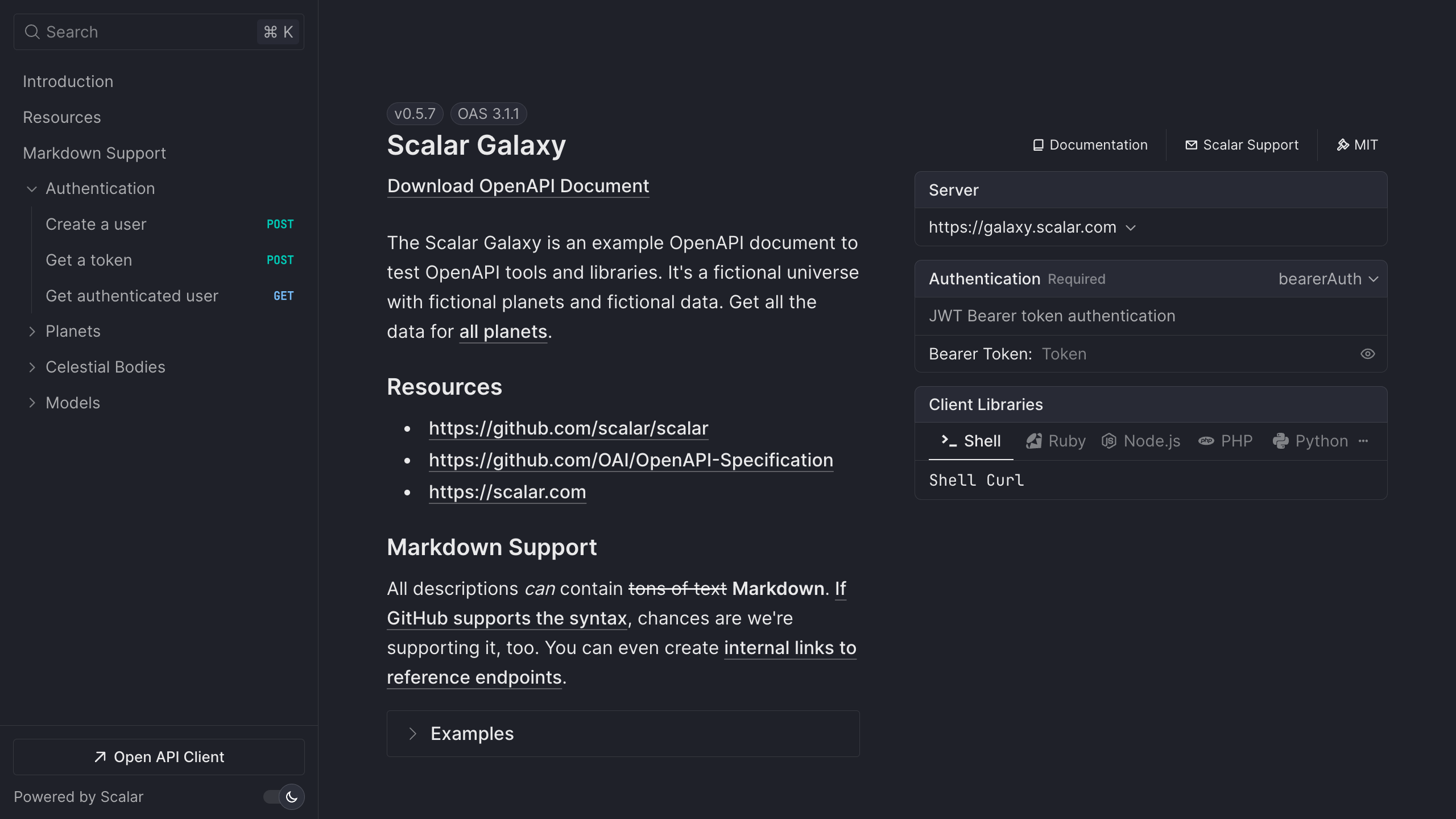Scalar API Reference Plugin for FastAPI

Installation
pip install scalar-fastapi
Usage
FastAPI makes it super easy to enable Scalar with their out of the box OpenAPI support.
Basic Usage
from fastapi import FastAPI
from scalar_fastapi import get_scalar_api_reference
app = FastAPI()
@app.get("/")
def read_root():
return {"Hello": "World"}
@app.get("/scalar", include_in_schema=False)
async def scalar_html():
return get_scalar_api_reference(
# Your OpenAPI document
openapi_url=app.openapi_url,
# Avoid CORS issues (optional)
scalar_proxy_url="https://proxy.scalar.com",
)
Multiple OpenAPI Sources
You can now display multiple OpenAPI documents in a single Scalar instance:
from scalar_fastapi import get_scalar_api_reference, OpenAPISource
@app.get("/scalar", include_in_schema=False)
async def scalar_html():
return get_scalar_api_reference(
sources=[
OpenAPISource(
title="User API",
url="/openapi.json",
default=True
),
OpenAPISource(
title="Admin API",
url="/admin/openapi.json"
),
OpenAPISource(
title="External API",
content='{"openapi": "3.0.0", ...}'
)
],
title="My API Documentation"
)
Direct OpenAPI Content
You can pass OpenAPI content directly as a string or dictionary:
@app.get("/scalar", include_in_schema=False)
async def scalar_html():
return get_scalar_api_reference(
content='{"openapi": "3.0.0", "info": {"title": "My API"}}',
title="My API"
)
Configuration
Currently available configuration options are listed below.
Core Configuration
openapi_url(defaultNone) - The OpenAPI URL that Scalar should load. Ifcontentorsourcesare provided, this parameter is ignored.content(defaultNone) - Directly pass an OpenAPI/Swagger document as a string (JSON or YAML) or as a dictionary. Ifsourcesare provided, this parameter is ignored.sources(defaultNone) - Add multiple OpenAPI documents to render all of them. Each source can have a title, slug, url, content, and default flag.title(default"Scalar") - The title of the API reference page
OpenAPISource Configuration
When using multiple sources, each OpenAPISource can be configured with:
title(defaultNone) - Display name for the API. If not provided, will fallback to 'API #1', 'API #2', etc.slug(defaultNone) - URL identifier for the API. If not provided, will be auto-generated from the title or index.url(defaultNone) - URL to the OpenAPI document (JSON or YAML). Mutually exclusive with content.content(defaultNone) - Direct OpenAPI content as string (JSON/YAML) or dictionary. Mutually exclusive with url.default(defaultFalse) - Whether this source should be the default when multiple sources are provided.
Display Options
layout(defaultLayout.MODERN)show_sidebar(defaultTrue)hide_models(defaultFalse)hide_search(defaultFalse) - Whether to show the sidebar search barhide_test_request_button(defaultFalse) - Whether to show the "Test Request" buttonhide_download_button(defaultFalse) - Deprecated: Usedocument_download_typeinsteaddocument_download_type(defaultDocumentDownloadType.BOTH) - Sets the file type of the document to download. Options:JSON,YAML,BOTH,NONE
DocumentDownloadType
from scalar_fastapi import DocumentDownloadType
# Available options:
DocumentDownloadType.JSON # Download as JSON only
DocumentDownloadType.YAML # Download as YAML only
DocumentDownloadType.BOTH # Download as both JSON and YAML
DocumentDownloadType.NONE # Hide download button
Theme and Appearance
dark_mode(defaultTrue)force_dark_mode_state(defaultNone) - Force dark mode state to always be this state. Can be 'dark' or 'light'hide_dark_mode_toggle(defaultFalse) - Whether to show the dark mode togglewith_default_fonts(defaultTrue) - Whether to use default fonts (Inter and JetBrains Mono)custom_css(default"") - Custom CSS string to apply to the API reference
Search and Navigation
search_hot_key(defaultSearchHotKey.K)default_open_all_tags(defaultFalse)expand_all_model_sections(defaultFalse) - Whether to expand all model sections by defaultexpand_all_responses(defaultFalse) - Whether to expand all response sections by defaultorder_required_properties_first(defaultTrue) - Whether to order required properties first in schema objects
Server Configuration
base_server_url(default"") - If you want to prefix all relative servers with a base URLservers(default[])hidden_clients(default[])
Authentication
authentication(default{})hide_client_button(defaultFalse) - Whether to show the client button from the reference sidebar and modalpersist_auth(defaultFalse) - Whether to persist authentication credentials in local storage
Advanced
scalar_js_url(default"https://cdn.jsdelivr.net/npm/@scalar/api-reference")scalar_proxy_url(defaultNone)integration(defaultNone)theme(defaultTheme.DEFAULT)
Layout
from scalar_fastapi import Layout
# Available options:
Layout.MODERN # Modern layout
Layout.CLASSIC # Classic layout
SearchHotKey
from scalar_fastapi import SearchHotKey
# Available options:
SearchHotKey.K # Use 'K' key
SearchHotKey.CMD_K # Use 'Cmd+K' (Mac) / 'Ctrl+K' (Windows/Linux)
SearchHotKey.NONE # Disable hotkey
Theme
from scalar_fastapi import Theme
# Available options:
Theme.DEFAULT # Default theme
Theme.NONE # No theme